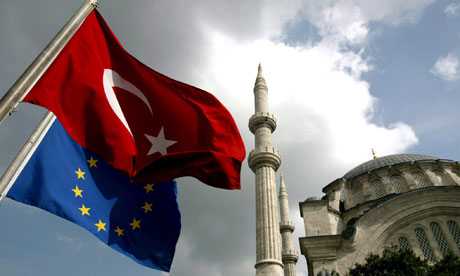I first saw Gaziantep only about five years ago. My fault, totally: I have to admit. What struck me in Gaziantep at first sight was its close resemblance to my hometown, Bursa. That astonished me at the time. Another fault, I know. Gaziantep is in the southeast of Asia Minor, while Bursa is in the northwest. But they look very much alike. Especially nowadays with the opening of new shopping malls in Gaziantep, they resemble each other more.
But the structure of their industries in the two respective cities differ. Why is that so? Bursa mainly trades with the European Union, while Gaziantep’s number-one market is Iraq. Geographical proximity is important. Your neighborhood determines the sophistication level of your industrial development. That is where reality bites back despite all arguments to the contrary. Turkey belongs to Europe. So it is correct to call Turkey Europe Minor instead of Asia Minor. Let me tell you why.
Gaziantep trades more with Iraq and our other Eastern neighbors, nowadays. It is a choice dictated by geography and necessity. The total foreign trade of Gaziantep, as a province, is on par with the total trade of a unified Cyprus or Malta. Gaziantep has become an industrial production base in the last 30 years, with an export volume of above $3 billion. The policy reforms of 1980 that started the Turkish opening led to the development of new industrial centers on the periphery.
Let me underline three issues regarding these figures. First of all, Turkey has become a center for industrial activity in the last 30 years through close economic relations with the West. Europe is still our number-one trading partner. The demand pattern of Europe has determined the pattern of industrial development in Turkey. This is where industrial development is contagious. Europe’s demand pattern has determined us. Turkey’s demand pattern, on the other hand, has the capacity to determine the shape of industry in our East. That is how the impact of the EU and Europeanness will move to the East. Our friends in Europe still have difficulty in understanding this transformation, but they will understand its importance. The Arab Spring will be helpful.
Second, Turkey’s move to the East in the last 10 years is providing two results, both of which are positive. One is the diversification of Turkish industry in terms of both product space and target markets. The United States is the most diversified of economies in the world. Turkey has also become more diversified. The second positive result is the decline in the level of regional disparities. The geographic proliferation of the industrial base and the emergence of Gaziantep as a new industrial center have led to a decline in regional disparities. I am not claiming that the problem has been solved; just that steps are being taken in the right direction. These could be taken as push factors toward the East.
The third point is to underline pull factors or enabling factors. One is the U.S. invasion of Iraq, definitely. The invasion ended the embargo and practically opened Turkey’s gate to Middle Eastern markets. Another is the “zero problem policy with the neighbors” that effectively started earlier than Professor Ahmet Davutoğlu’s period in Turkish foreign policy under the direction of the late minister İsmail Cem. It is not a policy framework, but more of a guiding principle, really. If your neighbors do not have market economies, gaining access requires permission from the elites. You know what I mean!
This whole move toward the East does not undermine the fact that Turkey belongs to Europe. Starting from 2008, the sophistication of Turkey’s exports has been declining. Guess why? It is the European crisis! The goods you can sell to the East have lower sophistication vis-à-vis goods that go to Western markets; whereas good policy requires focusing on the production of high-end products as well. That’s where the future lies. That’s where Turkey inevitably belongs.
Guven Sak
via Turkey belongs to Europe – Hurriyet Daily News.
